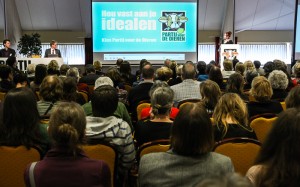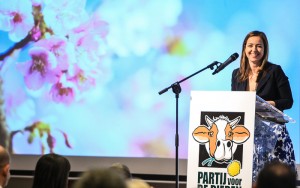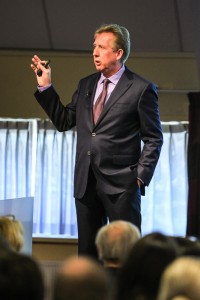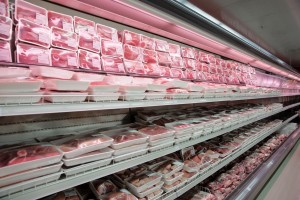Weltlog Woche 16 – 2013
Am Sonntag den 7. April hatten wir wieder einen enorm gut besuchten und das Herz erwärmenden Parteikongress in Doorn. Es gab unter anderem einen sehr schönen Vortrag von Professor Jan Rotmans. Er zitierte Herman Verhagen mit den Worten: Wir leben nicht in einem Zeitalter der Veränderung, sondern in einer Veränderung von Zeitaltern. Sehr treffende Aussage!
Ich habe über die Anwesenheit von Haustieren in Lebensmitteln und Viehfutter Parlamentsfragen gestellt. In der niederländischen Zeitung NRC stand letzte Woche ein Artikel indem vor Augen geführt wird, dass in Spanien Strassenhunde, angefahrenes Wild und Haustiere in Produkte verarbeitet werden, die unter anderem als Basis für Viehfutter verkauft werden. Die Möglichkeit besteht, dass dies auch an niederländische Unternehmen geliefert wurde. Ausserdem wird ein niederländisches Unternehmen verdächtigt hieran beteiligt zu sein. Unserer Meinung nach muss diesem Unternehmen sofort die Zulassung entzogen werden.
Und noch ein Fleischskandal von beispiellosem Ausmass. Ganze 50 Millionen Kilo verdächtiges Fleisch sind seit 2011 in Pizzen, Konserven und Fertiggerichten verarbeitet worden. Die Lebensmittelindustrie spricht von hunderten Millionen Mahlzeiten in denen verdächtiges Fleisch verarbeitet wurde. Die niederländische Lebensmittelbehörde (NVWA) sagt hier erst jetzt von zu wissen.
Die Ursache all dieser Fleischskandale liegt in der Tatsache, dass die Lebensmittelindustrie so billig wie mögliches Fleisch will, es gibt kaum Kontrollen, weil der Metzger buchstäblich sein eigenes Fleisch genehmigt (Selbstregulation) und in den letzten Jahren gross eingespart wurde an den Überwachungsaufgaben der NVWA. Alles zu Lasten von Mensch und Tier. Die NVWA muss viel besser funktionieren um derart betrügerische Praktiken aufspüren zu können.
Ich habe letzten Donnerstag eine Debatte angefragt und die wird es wahrscheinlich nächste Woche geben. Die Partei für die Tiere will, dass die NVWA unverzüglich die Liste der Unternehmen, denen das Fleisch verkauft wurde, öffentlich macht, so dass der Konsument sich selbst schützen kann. Bis jetzt verweigert sie das. Die NVWA sagt, es gäbe keinerlei Hinweise dafür, dass das Fleisch eine Gefahr für die Volksgesundheit sei, zugleich sagt sie aber absolut nicht zu wissen wo das Fleisch herkommt. Mit einem derart falschem Beruhigungsversuch macht sich die NVWA natürlich total unglaubwürdig. Für unseren Antrag, die Liste direkt öffentlich zu machen, bekamen wir in der zweiten Kammer des Parlaments leider keine Unterstützung von den Traditionsparteien PvdA, VVD, D66 und CDA. Die VVD und die CDA (die Liberalen und die Christdemokraten) sagten sowieso kein Bedürfnis an einer Debatte zu haben. Der Staatssekretär für Wirtschaftsfragen muss jetzt vor kommendem Dienstag auf den Antrag reagieren.
Auch Frankreich erwärmt sich für den Gedanken, dass wir von tierischem auf pflanzliches Eiweiss wechseln müssen. Sehr Gut! Noch mehr Nachrichten aus Frankreich: Es stand ein wunderbarer Beitrag in der französischen Huffington Post, aufgrund der Buchpräsentation von Meat the Truth von vor zwei Wochen in Paris.
Bis nächste Woche!
On Sunday, April 7 we had a heart-warming party conference in Doorn with a huge turnout. We enjoyed such things as a fantastic speech by professor Jan Rotmans in which he quoted Herman Verhagen: We do not live in an era of change but in a change of eras. A very catchy statement!
I asked parliamentary questions about pets being found in food and cattle feed. Last week, a Dutch newspaper called NRC contained an article that touched on how in Spain, unwanted dogs, wild animals that have been hit by cars, and pets are being processed into products that are sold as such things as raw material for animal feed. It’s very possible that this feed is being supplied to Dutch businesses. A Dutch business is also suspected of being involved. As far as we’re concerned, this business should immediately lose their licence.
And yet another meat scandal of unprecedented scale. At least 50 million kilograms of suspicious meat have been added to pizzas, cans, and ready-to-eat meals since 2011! The foodstuff industry says hundreds of millions of meals have had suspicious meat included. The Dutch Food and Consumer Product Safety Authority (NVWA) say they’ve only just found out about this.
All these meat scandals are down to the fact that the food industry focuses on making meat as cheap as possible. Very few checks are performed because the government itself gives the seal of approval – which is self-regulation – and they have made considerable cuts to the NVWA’s supervision these past few years. And it is both animals and humans that pay. The NVWA needs to be able to function on a much higher level in order to be able to detect these types of fraudulent practices!
Last Thursday, I asked for a debate, which will probably take place next week. The Party for the Animals wants the NVWA to immediately publish the list of businesses to which the meat was sold, so consumers can protect themselves. They have refused to do so up to this point. The NVWA says there are no indicators that the meat poses a threat to public health, but at the same time says they absolutely do not know where the meat comes from. The NVWA are doing themselves no favours with these false reassurances. Unfortunately, we in the Lower House have received no support from the traditional parties of the Dutch Labour Party (PvdA), the People’s Party for Freedom and Democracy (VVD), D66, and the Christian Democratic Alliance (CDA) for making the list public as quickly as possible. The VVD and the CDA said they had no need of a debate. The State Secretary of Economic Affairs must now react to our request before this Tuesday.
France is warming up to the idea that we need to switch from animal to vegetable proteins. Wonderful! More news from France: there was a great review in the French Huffington Post as a result of our Meat the Truth book presentation two weeks ago in Paris.
See you next week!



